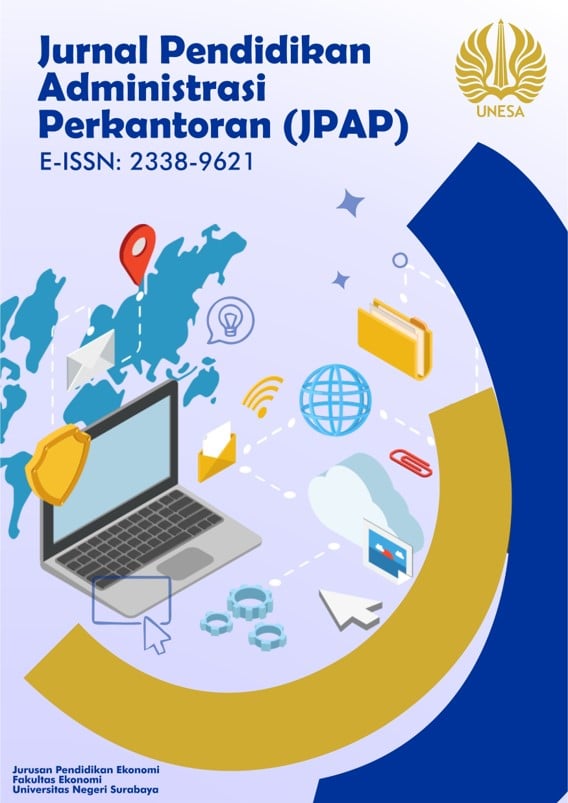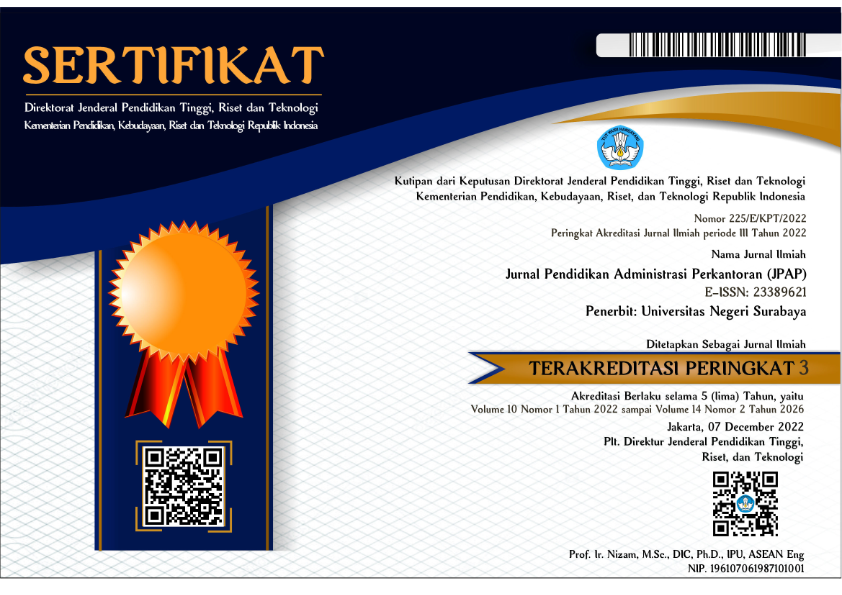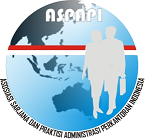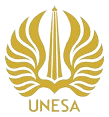Efektivitas Penerapan E-Performance di Kelurahan Gunung Anyar Tambak Kota Surabaya
DOI:
https://doi.org/10.26740/jpap.v9n1.p169-185Keywords:
Effectiveness, E-PerformanceAbstract
E-Performance is a performance management information system that evaluates the performance of civil servants and serves as a guide in granting additional performance money. One of a government who implementing e-Performance is Kelurahan Gunung Anyar Tambak, Surabaya City. Implementation of e-Performance in Kelurahan Gunung Anyar Tambak Surabaya city starting since 2016, there is no research that assesses how effective the implementation of e-Performance in Kelurahan Gunung AnyarTambak Surabaya City. Therefore, this study aims to determine the effectiveness of the implementation of e-Performance based on four aspects of e-Performance assessment, namely aspects of cost, quality aspects, time aspects, and aspects of work behavior. This research is descriptive research with quantitative approach. This research uses saturated sampling technique in which all members of the population are used as members of the research sample. The total sample in this research were 8 person, they are civil servant in Kelurahan Gunung Anyar Tambak Surabaya City. Data collection techniques in this research using questionnaires and interviews and data analysis techniques using quantitative and descriptive analysis technique. The conclusion of this research is implementation of e-Performance is effective. This result can be proven from two aspects which are categorized quite effective, these aspects are cost aspect and quality aspect, while aspects of time and aspects of work behavior are considered effective. Based on the assessment of respondents, the effectiveness of the implementation of eperformance can be said to be effective.References
Adisasmita, R., & Ahardjo. (2011). Pengelolaan Pendapatan dan Anggaran Daerah. Yogyakarta. Graha Ilmu.
Akadun. (2009). Teknologi Informasi Administrasi. Bandung. Alfabeta.
Al-raisi, A. A., Amin, S., & Tahir, S. (2010). E-Performance Management System: Its Implementation and Effectiveness within the United Arab Emirates Federal Government Organizations. The International Journal of Business and Management Research (IJBMR). 5 (1). 1-15.
Antoni, A. (2018). Terkuak Fakta 1,35 Juta PNS Berkinerja Buruk. Okezone.com. (https://economy.okezone.com/read/2018/11/15/320/1978052/terkuak-fakta-1-35-juta-pns-berkinerja-buruk, diakses pada 16 Mei 2020).
Arikunto, S. (2014). Prosedur Penelitian Suatu Pendekatan Praktik. Jakarta. Rimeka Cipta.
Arisandi, M. M. (2014). Pengaruh Sistem E-Performance Terhadap Kinerja dan Kompensasi PNS di Bapemas dan KB Kota Surabaya. Jurnal ILmu & Riset Akuntansi, 3(9), 116.
Arie, N. A. (2019). Effect of E-Performance and Granting of Additional Performance Income on Employees Performance At the Regional Environment Secretariat of Lamongan District, Indonesia. Russian Journal of Agricultural and Socio-Economic Sciences, 90(6), DOI 10.18551. 238251\
Bungkaes, H. R. (2013). Hubungan Efektivitas Pengelolaan Program Raskin Dengan Peningkatan Kesejahteraan Masyarakat Di Desa Mamahan Kecamatan Gemeh Kabupaten Kepualauan Talaud. Journal œ ACTA DIURNA Edisi April 2013, walfare, 123.
Damayanti, S. (2014). Penggajian Berbasis Kinerja di Sekretariat Pemerintah Kota Surabaya melalui Program e-Performance dan Tambahan Penghasilan Pegawai ( TPP ). Kebijakan dan Manajemen Publik. 2 (1), 110.
Elysia, Ake Wihadanto, S. (2017). Implementasi E-Government Untuk Mendorong Pelayan an Publik Yang Terintegrasi di Indonesia. Optimalisasi Peran Sains Dan Teknologi Untuk Mewujudkan Smart City, 353380. http://repository.ut.ac.id/7083/1/UTFMIPA2017-14-vita.pdf
Emzir. (2009). Metodologi Penelitian Pendidikan. Jakarta. Pt Raja Grafindo Persada.
ePerformance Sistem Informasi Manajemen Kinerja Pegawai Pemerintah Kota Surabaya. (2019). (https://eperformance.surabaya.go.id/2020/, diakses pada 12 Januari 2020).
Instruksi Presiden Nomor 3 tahun 2003 tentang Kebijakan dan Strategi Nasional Pengembangan e-Government.
Latuserimala, N. M. (2015). Studi Deskriptif efektivitas Sistem e-Performance Dalam Meningkatkan Kinerja Pegawai Dinas Pekerjaan Umum dan Pematusan Kota Surabaya. Kebijakan Dan Manajemen Publik, 3(April), 18.
Masruri, M., & Muazansyah, I. (2017). Analisis efektifitas program nasional pemberdayaan masyarakat mandiri perkotaan (PNPM-MP). Journal of Governance and Public Policy, 4(2). 363-393.
Nangameka, Teressa & Anshori, A. (n.d.). Efektivitas Penerapan Sistem e-Performance Dalam Menunjang Kinerja Pegawai di Kecamatan Gunung Anyar Kota Surabaya Provinsi Jawa Timur. Jurnal MSDA. 6 (2). 171194.
Peraturan Walikota Surabaya Nomor 13 Tahun 2019 Tentang Petunjuk Teknis Pemberian Uang Kinerja pada Belanja Langsung.
Pradikta, E. S. (2014). Efektivitas Program E-Performance Sebagai Upaya Untuk Mewujudkan Peningkatan Kinerja Dinas Kebersihan Dan Pertamanan Kota Surabaya. 2, 110.
Rianto, B. dkk. (2012). Polri dan Aplikasi E-Goverment dalam Pelayanan Publik. Surabaya. Putra Media Nusantara.
Riduwan. (2012). Dasar-dasar Statistika. Bandung. Alfabeta.
Riduwan. (2018). Dasar-Dasar Statistika. Bandung. Alfabeta.
Ruseffendi, E. T. (2010). Dasar-Dasar Penelitian Pendidikan dan Bidang Non Eksakta Lainnya. Bandung. Tarsito.
Sedarmayanti. (2009). Reformasi Administrasi Publik, Reformasi Birokrasi, dan Kepemimpinan Masa Depan. Bandung. Refika Aditama.
Sekaran, Uma., R. B. (2013). Research Methods For Business (4th ed.). Jakarta. Wiley.
Sugiyono. (2017). Metode Penelitian Kombinasi (Mix Methods). Bandung. Alfabeta.
Sugiyono. (2018). Metode Penelitian Kombinasi (Mix Methods). Bandung. Alfabeta.
Sutabri, T. (2014). Pengantar Teknologi Informasi. Yogyakarta. Andi.
Akadun. (2009). Teknologi Informasi Administrasi. Bandung. Alfabeta.
Al-raisi, A. A., Amin, S., & Tahir, S. (2010). E-Performance Management System: Its Implementation and Effectiveness within the United Arab Emirates Federal Government Organizations. The International Journal of Business and Management Research (IJBMR). 5 (1). 1-15.
Antoni, A. (2018). Terkuak Fakta 1,35 Juta PNS Berkinerja Buruk. Okezone.com. (https://economy.okezone.com/read/2018/11/15/320/1978052/terkuak-fakta-1-35-juta-pns-berkinerja-buruk, diakses pada 16 Mei 2020).
Arikunto, S. (2014). Prosedur Penelitian Suatu Pendekatan Praktik. Jakarta. Rimeka Cipta.
Arisandi, M. M. (2014). Pengaruh Sistem E-Performance Terhadap Kinerja dan Kompensasi PNS di Bapemas dan KB Kota Surabaya. Jurnal ILmu & Riset Akuntansi, 3(9), 116.
Arie, N. A. (2019). Effect of E-Performance and Granting of Additional Performance Income on Employees Performance At the Regional Environment Secretariat of Lamongan District, Indonesia. Russian Journal of Agricultural and Socio-Economic Sciences, 90(6), DOI 10.18551. 238251\
Bungkaes, H. R. (2013). Hubungan Efektivitas Pengelolaan Program Raskin Dengan Peningkatan Kesejahteraan Masyarakat Di Desa Mamahan Kecamatan Gemeh Kabupaten Kepualauan Talaud. Journal œ ACTA DIURNA Edisi April 2013, walfare, 123.
Damayanti, S. (2014). Penggajian Berbasis Kinerja di Sekretariat Pemerintah Kota Surabaya melalui Program e-Performance dan Tambahan Penghasilan Pegawai ( TPP ). Kebijakan dan Manajemen Publik. 2 (1), 110.
Elysia, Ake Wihadanto, S. (2017). Implementasi E-Government Untuk Mendorong Pelayan an Publik Yang Terintegrasi di Indonesia. Optimalisasi Peran Sains Dan Teknologi Untuk Mewujudkan Smart City, 353380. http://repository.ut.ac.id/7083/1/UTFMIPA2017-14-vita.pdf
Emzir. (2009). Metodologi Penelitian Pendidikan. Jakarta. Pt Raja Grafindo Persada.
ePerformance Sistem Informasi Manajemen Kinerja Pegawai Pemerintah Kota Surabaya. (2019). (https://eperformance.surabaya.go.id/2020/, diakses pada 12 Januari 2020).
Instruksi Presiden Nomor 3 tahun 2003 tentang Kebijakan dan Strategi Nasional Pengembangan e-Government.
Latuserimala, N. M. (2015). Studi Deskriptif efektivitas Sistem e-Performance Dalam Meningkatkan Kinerja Pegawai Dinas Pekerjaan Umum dan Pematusan Kota Surabaya. Kebijakan Dan Manajemen Publik, 3(April), 18.
Masruri, M., & Muazansyah, I. (2017). Analisis efektifitas program nasional pemberdayaan masyarakat mandiri perkotaan (PNPM-MP). Journal of Governance and Public Policy, 4(2). 363-393.
Nangameka, Teressa & Anshori, A. (n.d.). Efektivitas Penerapan Sistem e-Performance Dalam Menunjang Kinerja Pegawai di Kecamatan Gunung Anyar Kota Surabaya Provinsi Jawa Timur. Jurnal MSDA. 6 (2). 171194.
Peraturan Walikota Surabaya Nomor 13 Tahun 2019 Tentang Petunjuk Teknis Pemberian Uang Kinerja pada Belanja Langsung.
Pradikta, E. S. (2014). Efektivitas Program E-Performance Sebagai Upaya Untuk Mewujudkan Peningkatan Kinerja Dinas Kebersihan Dan Pertamanan Kota Surabaya. 2, 110.
Rianto, B. dkk. (2012). Polri dan Aplikasi E-Goverment dalam Pelayanan Publik. Surabaya. Putra Media Nusantara.
Riduwan. (2012). Dasar-dasar Statistika. Bandung. Alfabeta.
Riduwan. (2018). Dasar-Dasar Statistika. Bandung. Alfabeta.
Ruseffendi, E. T. (2010). Dasar-Dasar Penelitian Pendidikan dan Bidang Non Eksakta Lainnya. Bandung. Tarsito.
Sedarmayanti. (2009). Reformasi Administrasi Publik, Reformasi Birokrasi, dan Kepemimpinan Masa Depan. Bandung. Refika Aditama.
Sekaran, Uma., R. B. (2013). Research Methods For Business (4th ed.). Jakarta. Wiley.
Sugiyono. (2017). Metode Penelitian Kombinasi (Mix Methods). Bandung. Alfabeta.
Sugiyono. (2018). Metode Penelitian Kombinasi (Mix Methods). Bandung. Alfabeta.
Sutabri, T. (2014). Pengantar Teknologi Informasi. Yogyakarta. Andi.
 Abstract views: 797
,
Abstract views: 797
, PDF Downloads: 1908
PDF Downloads: 1908










